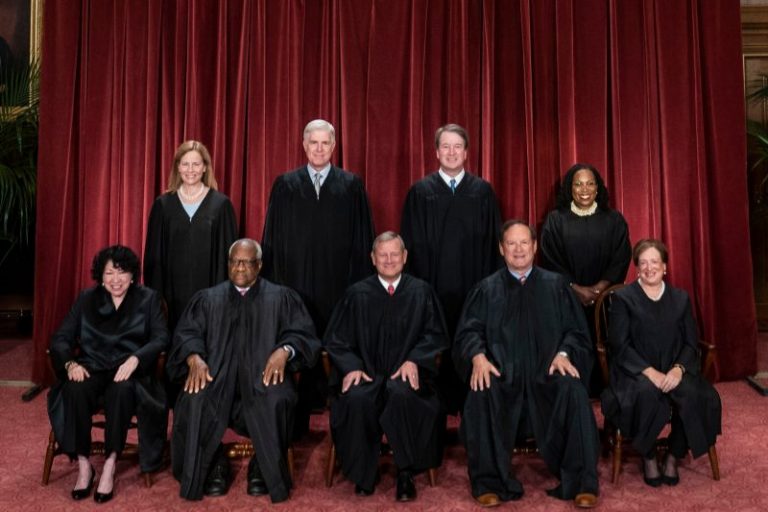The Supreme Court ruled Thursday for a company that alleges striking workers conspired to damage its property, the latest setback for organized labor at the high court and one that could make unions more liable for economic losses attributable to work stoppages.
The court’s 8-1 opinion was written by Justice Amy Coney Barrett, who said that the actions of striking truck drivers at Glacier Northwest concrete company in Washington state were not protected by the National Labor Relations Act, the 1935 statute that governs collective bargaining.
That statute requires unions to take reasonable precautions to protect an employer’s property when workers go on strike. In this case, Barrett wrote, “the Union took affirmative steps to endanger Glacier’s property … the NLRA does not arguably protect its conduct.”
Drivers walked off the job at Glacier after their trucks had been filled with wet concrete, causing what Barrett said was a “mad scramble” to protect the trucks and dispose of the rapidly hardening material. She said the company only created the concrete because the drivers pretended they would deliver it.
Two of the court’s three liberals, who often side with organized labor, agreed with Barrett’s ruling. The third, Justice Ketanji Brown Jackson, issued a solo dissent, notable for a first-term member of the court.
Jackson, whose disagreement ran twice as long as the majority opinion, said the ruling threatens to “erode the right to strike.” Unions, she wrote, have no duty to make sure a company will not suffer economic losses when a strike decision is made.
“Workers are not indentured servants, bound to continue laboring until any planned work stoppage would be as painless as possible for their master,” Jackson wrote. “They are employees whose collective and peaceful decision to withhold their labor is protected by the NLRA even if economic injury results.”
Although Barrett’s opinion occupied ground between Jackson and a broader ruling desired by the court’s most conservative justices, the union that represents Glacier workers blasted the decision by what it called the “political hacks at the Supreme Court.”
“These corruptible justices should be ashamed of themselves,” Teamsters General President Sean M. O’Brien said in a fiery statement. He vowed that “the Teamsters will strike any employer, when necessary, no matter their size or the depth of their pockets. Unions will never be broken by this Court or any other.”
The case involves an August 2017 work stoppage at Glacier after negotiations between the company and its unionized employees broke down. The company had loaded batches of wet concrete into the rotating drums of its trucks for delivery. But a union representative told the drivers out on their rounds to return instead and walk off the job. That left the company’s bosses and non-striking employees to find a way to dump the concrete in an environmentally sensitive way before it could harden and permanently damage the trucks.
The company says the trucks were saved. It sued the union workers in state court for losses related to the wasted concrete.
Eventually, the Washington Supreme Court stopped the lawsuit, agreeing with the union that the NLRA and its authority over union activity took priority over state court claims. In its view, “the NLRA preempts Glacier’s tort claims related to the loss of its concrete product because that loss was incidental to a strike arguably protected by federal law.”
But Barrett wrote that the National Labor Relations Board has recognized that the law does not shield striking workers who fail to take “reasonable precautions” to “protect their employer’s property from foreseeable, aggravated, and imminent danger due to the sudden cessation of work.”
“Far from taking reasonable precautions to mitigate foreseeable danger to Glacier’s property,” Barrett wrote, “the Union executed the strike in a manner designed to compromise the safety of Glacier’s trucks and destroy its concrete. Such conduct is not ‘arguably protected’ by the NLRA; on the contrary, it goes well beyond the NLRA’s protections.”
She noted that the NLRB has found in the past that the act’s protections do not cease to exist just because a strike is timed to put pressure on the employer — when crops needs to be picked, for instance, or milk and cheese could spoil.
But in the case of the Glacier strike, she wrote, the workers actions “prompted the creation of the perishable product.”
Jackson wrote that the NLRB is still investigating that allegation by Glacier, and she accused her colleagues of rushing to decide the case.
“Fortunately, the pending Board determination of what actually happened in connection with this particular strike will establish — as a matter of fact and not mere allegation — what precautions (if any) the drivers actually took and what harm (if any) the Union’s conduct actually posed to Glacier’s trucks,” Jackson wrote.
The court has grown increasingly conservative in recent years and has dealt blows to organized labor in rulings relating to the unionization of farmworkers and the collection of union fees. Those decisions prompted sharper division between the ideological wings of the court than Thursday’s decision.
The case is Glacier Northwest v. International Brotherhood of Teamsters Local Union No. 174.

